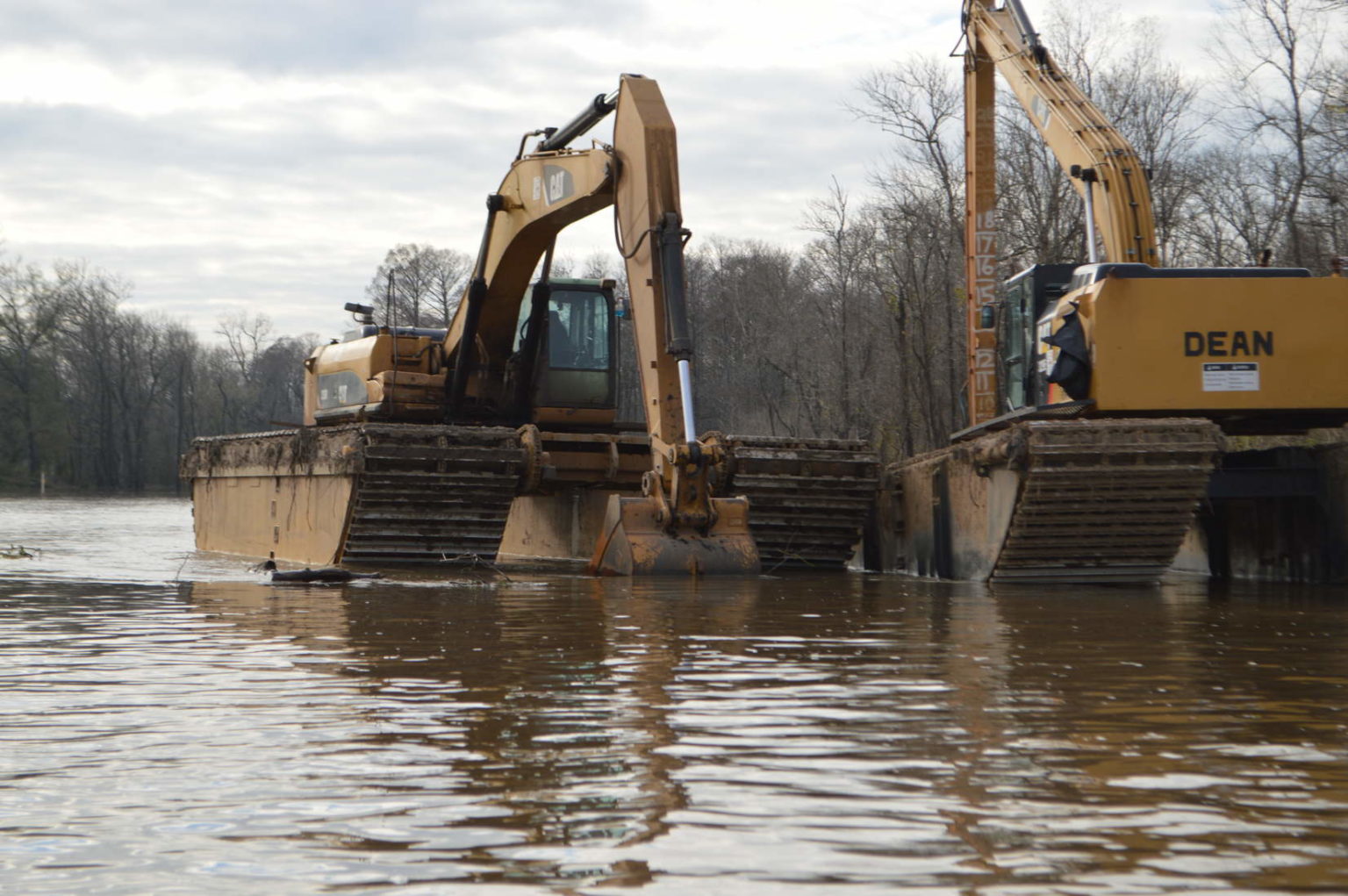Since October 2018, the Mississippi River has been running high, thanks in part to heavier-than-usual rainfall across its northern and central stretches.
And when the water flows high on the most powerful river in the U.S., local residents and industries take notice. Fishermen fret the high January waters could mean a poor brown shrimp season ahead. Shippers using barges to haul grain bemoan headaches caused by fast-flowing waters and the river-traffic restrictions that follow. And federal agencies like the Army Corps of Engineers start inspecting levees daily and barring digging within 1,500 feet of the embankments built to protect river-side residents against flooding.
But in the swamps of the Atchafalaya Basin, roughly a million acres of bayous, lakes, and wetlands that span upwards from the Gulf of Mexico for 140 miles into Louisiana, there’s one thing that hasn’t responded as it should to the rising waters: construction of Energy Transfer’s Bayou Bridge pipeline.
That’s according to a legal motion filed today by attorneys for a coalition of fishing industry representatives and environmental groups, asking a federal court to pause construction of the pipeline and review its permit.
Challenging a Pipeline Company Promise
Despite the fact that the company’s Army Corps of Engineers permit says construction must halt under high water conditions, Energy Transfer, which co-owns the pipeline along with its affiliates, has pressed on with pipeline construction — something the builder promised the court it would not do, according to the motion filed in a Louisiana federal court today.
The company has been using excavators to dig amid high waters without proper environmental controls, destroyed old-growth cypress trees, and managed sediment so poorly that “it’s placing the people of Louisiana at risk by reducing the effectiveness of the Basin as a buffer against dangerous floodwaters,” according to the environmental groups.
“In all my 31 years working in the Atchafalaya Basin I’ve never seen anything like this,” Atchafalaya Basinkeeper Director Dean Wilson said in a statement. “The amount of unnecessary destruction of wetlands is heartbreaking.”
 Dean Wilson, executive director of the Atchafalaya Basinkeeper, documented alleged permit violations described in the lawsuit. Credit: © 2018 Julie Dermansky
Dean Wilson, executive director of the Atchafalaya Basinkeeper, documented alleged permit violations described in the lawsuit. Credit: © 2018 Julie Dermansky
Digging in High Waters
Outside New Orleans, flood gauges first crossed the “high water” mark — 11 feet at the Carrolton Station, according to the Army Corps — three months ago, and have remained consistently over 11 feet since mid-December.
“This flood fight originally was supposed to last a few days back in October,” Matt Roe, a U.S. Army Corps of Engineers spokesman, told a New Orleans NBC News affiliate last week. “Here we are in mid-January, we’re still in it.”
DeSmog’s Julie Dermansky has visited the Bayou Bridge site over the course of the past year, accompanying Wilson, who has been documenting construction practices that the groups argue clearly violate the conditions of Bayou Bridge’s permits — including an early October visit, when Dermansky took photos and reported as the waters began to rise.
A white egret (center) stands atop a “spoil bank,” or line of trenched dirt and sediment, created during Bayou Bridge construction in early October as waters began to rise. Credit: © 2018 Julie Dermansky
The plaintiffs in the case, a group that includes Wilson, say they’ve repeatedly provided the Army Corps of Engineers with evidence of the alleged violations but that the Corps has failed to act.
Last year, the coalition of Bayou Bridge opponents had asked the same judge to pause construction because of insufficiencies in the pipeline’s permit from the Army Corps of Engineers and the company’s plans to replace old-growth cypress trees up to 1,000 years old with smaller, younger trees.
A federal judge granted that motion, citing irreversible harm, but the ruling was reversed by the Fifth Circuit in a split 2-1 opinion. The Fifth Circuit found that since there were no trees similar to the old-growth cypress available as replacements, state law allowed the company to substitute younger trees instead.
During that fight, the pipeline company had used the permit’s prohibition on construction work during “high water” events to defend itself.
“And in fact, your honor, in the [Army Corps of Engineers] permit, it says in a condition that, if there is in fact a high water event that occurs during construction, we have to stop construction,” an attorney for the pipeline company told the judge, according to today’s filing. “We don’t see how in light of all of the conditions, unless one is going to assume regulatory failure and the Corps is not going to enforce its conditions and its permit conditions, we don’t see how any of this harm is going to occur.”
But construction, the new filing contends, did not stop.
Bayou Bridge construction activity in high waters documented by the Atchafalaya Basinkeeper. Credit: © 2019 Atchafalaya Basinkeeper
Wilson and other environmentalists have provided the Army Corps of Engineers with documentation of continued construction and other permit violations – but the Corps has not acted, according to the lawsuit.
“The key issue here is that we are in an unusually wet year for this time and the waters are rising rapidly in the basin,” EarthJustice attorney Jan Hasselman, who represents the environmental groups in the case, told DeSmog. “So, the company has not been able to get the project completed in a timely way and they are out there now with excavators on barges, creating extraordinary harm in this fragile place.”
Bobcats, alligators, aquatic rodents known as nutria, bald eagles, and more than a hundred fish species all call the Atchafalaya Basin, which is larger if perhaps less well-known than the Florida Everglades, home.
“The Atchafalaya Basin is one of North America’s ecological crown jewels,” Hasselman said. “It is critical habitat for countless species.”
A spokesperson for Energy Transfer did not immediately reply to a request for comment.
A Failure to Protect?
In 2017, Louisiana’s governor John Bel Edwards said he was endorsing the pipeline in part because environmental laws would be strictly enforced.
“I will tell you that I support the pipeline, but it’s because I know that the (state) Department of Natural Resources is going to make absolutely sure they abide by all the permit requirements, regulations, and state laws,” Edwards told Nola.com. “We’re not going to allow them to build this pipeline as they were built in decades previously. We’re going to move forward in a smart way, but I understand the controversy.”
The new lawsuit argues that the Army Corps of Engineers showed the pipeline company too much deference and failed to enforce federal laws designed to protect the environment.
“This is not a case where the Corps grappled with conflicting sources of information and used its expertise to make a reasoned determination,” attorneys from Earthjustice wrote in the 25-page motion. “This is a case where the Corps uncritically relied on complex technical information submitted by a self-interested proponent, and rubber-stamped the proponent’s environmental review with no attempt to verify its claims.”
Main image: Bayou Bridge pipeline construction activity in high waters documented by the Atchafalaya Basinkeeper. Credit: © 2019 Atchafalaya BasinkeeperSubscribe to our newsletter
Stay up to date with DeSmog news and alerts







